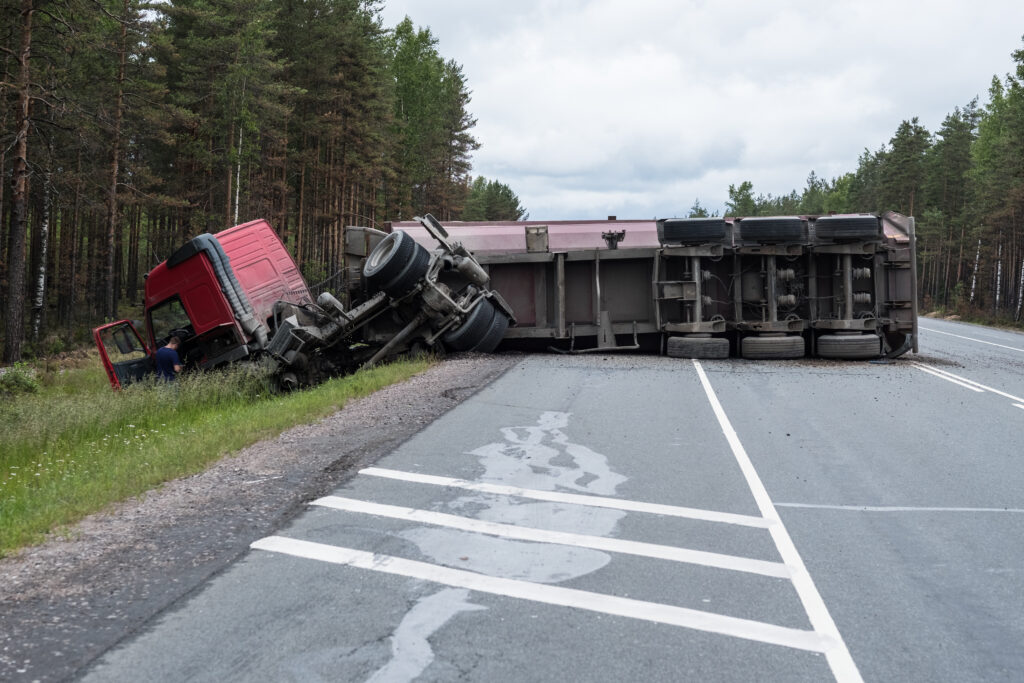When truck drivers and trucking companies are negligent, serious collisions and debilitating injuries may result. Some of the most common types of trucking accidents that result from negligence include sideswipe collisions, underride accidents, rear-end crashes, head-on collisions, and T-bone accidents.
If you recently suffered injuries in one of these collisions, it’s best you retain experienced legal counsel to represent you right away. A knowledgeable Chula Vista truck accident attorney can promptly investigate your accident circumstances, gather documentation, and file a claim or lawsuit in pursuit of the compensation you need.
Schedule A Free Case Evaluation Today!
Common Categories of Trucking Accidents and How They Frequently Occur
Truck accidents are often severe and can involve a variety of situations. Some of the most common categories of trucking accidents include rear-end collisions, jackknife accidents, rollover accidents, and underride crashes. Many of these accidents happen because of negligence by truck drivers or trucking companies.

- One common type is rear-end collisions, which happens when a truck driver is speeding or following too closely behind another vehicle. Due to the large size and weight of trucks, they require more distance to stop than smaller vehicles. If a truck driver isn’t paying attention or doesn’t leave enough room, they can crash into the vehicle ahead, causing serious damage.
- Jackknife accidents occur when the truck’s trailer swings out from behind the cab at an angle, forming a shape like a folding knife. This can happen when a driver suddenly brakes or loses control on a slick road. Driver inexperience, speeding, or improper braking are often the causes of these accidents.
- Rollover accidents are another dangerous type of crash. Trucks have a high center of gravity, making them more likely to tip over – especially when making sharp turns or going too fast around curves. A truck that’s improperly loaded or overloaded can increase the chances of a rollover. Trucking companies may be negligent by failing to enforce safety standards or properly maintain their fleet, leading to this type of accident.
- Underride accidents occur when a smaller vehicle slides underneath the back or side of a large truck. These accidents are often fatal because the top of the car can be crushed. Trucking companies can be held responsible if the truck didn’t have proper guards or if they didn’t enforce safe driving practices.
Negligence from trucking companies can include improper training, overloading trucks, not maintaining vehicles, or encouraging drivers to work beyond legal driving limits. Truck drivers may also be at fault for driving while fatigued, distracted, or impaired, which significantly increases the risk of an accident. Both drivers and trucking companies have a responsibility to follow safety regulations, and when they fail to do so, it can lead to devastating accidents and injuries.
Common Injuries in Truck Accidents
Trucking accidents often result in severe injuries due to the sheer size and weight of commercial trucks. Victims of these accidents can suffer a wide range of physical, mental, and emotional injuries, many of which require extensive medical treatment and long-term care.
Physically, some of the most common injuries include traumatic brain injuries (TBIs), spinal cord injuries, broken bones, and internal injuries.
- TBIs can occur when a victim’s head strikes a hard surface during the collision, leading to concussions, brain contusions, or more severe damage that can affect cognitive and motor functions.
- Spinal cord injuries, which can result in partial or complete paralysis, are often life-altering and may require surgery, physical therapy, and ongoing rehabilitation.
- Broken bones, particularly in the arms, legs, ribs, and pelvis, are also common due to the impact forces in a severe trucking accident. Victims with multiple fractures may need surgery, orthopedic care, and extensive rehabilitation.
- Internal injuries, such as damage to the liver, spleen, or lungs, are often less visible but equally dangerous. These may require emergency surgery and intensive care to stabilize the victim.
In addition to physical injuries, truck accident victims frequently experience significant mental-health issues, including post-traumatic stress disorder (PTSD), anxiety, and depression. PTSD may develop after a severe accident, causing flashbacks, nightmares, and difficulty coping with everyday life. Anxiety and depression can also manifest due to the trauma, pain, and lifestyle changes following a serious injury, and victims often need therapy or counseling to address these issues.
Emotionally, victims can suffer from feelings of helplessness, anger, or fear, especially if they are dealing with long-term disabilities or chronic pain. These emotional injuries can affect relationships, work performance, and overall quality of life.
Settling or Litigating a Truck Accident Case Successfully
Successfully settling or litigating a truck accident case involves several key steps that require careful preparation and a strong legal strategy from an experienced truck accident lawyer. The process begins immediately after the accident and continues through the settlement negotiations or court proceedings.
- Seek Ongoing Medical Attention and Document All Injuries – The first step after a truck accident is to seek medical care for all accident-related injuries. Medical records are critical to proving the extent of injuries and linking them to the accident. If ongoing medical care is necessary, it should be carefully documented, as this plays a significant role in calculating damages.
- Gather and Preserve Evidence – Strong evidence is key in trucking accident cases, including photographs of the accident scene, police reports, damage to vehicles, and any visible injuries. An experienced truck accident attorney may also preserve evidence from the truck, such as black box data or maintenance records, which can prove truck driver or trucking company negligence.
- Contact an Experienced Attorney – Working with a skilled attorney who regularly handles truck accident cases is highly recommended. Trucking companies and their insurance providers often have aggressive legal teams, so victims need someone who understands the laws and regulations specific to commercial trucking in their state. A skilled truck accident lawyer will handle all communications with the insurance company, file the necessary paperwork, and begin building a strong case.
- Investigate the Trucking Company and Driver – A thorough investigation into the trucking company and the driver’s history is also essential. This includes looking into the driver’s qualifications, hours-of-service logs, and any violations of federal trucking regulations. The trucking company’s maintenance records, safety practices, and hiring procedures can also be scrutinized for signs of negligence.
- Negotiation and Demand for Compensation – Once the investigation is complete, the attorney will send a demand letter to the insurance company outlining the evidence, injuries, and damages. Negotiations may follow, where both sides discuss a possible settlement. If a fair offer is made, the case can be settled without going to court.
- File a Lawsuit and Proceed to Trial (If Necessary) – If negotiations fail, the next step is to file a lawsuit. This moves the case into litigation, where both sides prepare for trial. During this phase, there may be depositions, expert testimony, and further evidence-gathering. If the case goes to trial, a judge or jury will decide the outcome and award damages.
Important Evidence in a Truck Accident Claim or Lawsuit

In a trucking accident case, gathering the right evidence is important to building a strong claim and proving fault and damages. There are several key types of evidence that play an important role in establishing liability and supporting the damages being claimed. This evidence can demonstrate negligence on the part of the truck driver, the trucking company, or both.
- Police Reports – A police report is one of the most important pieces of evidence in any accident case. After the accident, law enforcement officers usually investigate the scene and create an official report that includes details such as who was involved, witness statements, and their initial determination of fault. While not always definitive, police reports are highly influential and provide an objective record of the accident.
- Photographs and Videos – Pictures and videos from the accident scene can visually document critical information. This includes the condition of the vehicles, skid marks, road conditions, weather, and any visible injuries. Dash Cams, traffic cameras, or surveillance systems capture many accidents, providing important video evidence. Photos of vehicle damage and the surrounding area also help accident reconstruction experts piece together exactly what happened.
- Truck Driver Logs and Black Box Data – Federal regulations require truck drivers to keep detailed logs of their hours behind the wheel. These logs can show whether the driver was in compliance with laws regarding rest breaks and maximum driving hours. In addition, commercial trucks are often equipped with black boxes (electronic logging devices) that record key data such as speed, braking patterns, and driving hours. Black box data can be instrumental in proving whether the truck driver was speeding or failed to take necessary actions before the crash.
- Witness Statements – Statements from people who saw the accident unfold can be extremely valuable. Witnesses provide a third-party account of the events leading up to the accident and may confirm whether the truck driver was driving recklessly or distracted.
- Maintenance and Inspection Records – Maintenance records of the truck involved can reveal whether the trucking company properly maintained the vehicle. If faulty brakes or worn-out tires contributed to the accident, these records may show a pattern of negligence.
Together, these types of evidence can build a compelling case by showing how the accident occurred, who was at fault, and what damages the accident victim suffered.
Monetary Compensation for Injuries in a Commercial Truck Crash
In a truck accident claim or lawsuit, victims may be entitled to compensation for various losses, often called “damages.” These damages are meant to cover both the financial losses and the physical, emotional, and mental toll the accident has caused. Compensation in truck accident cases generally falls into two main categories: economic damages and non-economic damages.

- Medical Expenses – One of the most important types of recoverable damages in a truck accident case is for medical expenses. This includes the cost of emergency room visits, surgeries, hospital stays, doctor’s appointments, physical therapy, and any other treatment necessary to recover from the injuries. Victims may also recover compensation for future medical costs if they require long-term treatment or rehabilitation due to the severity of their injuries.
- Lost income – If the victim is unable to work due to injuries sustained in the trucking accident, they may recover lost earnings. This covers the income they would have earned during the time they were out of work. Additionally, if the injuries lead to permanent disability or a reduced ability to earn income, victims may be entitled to lost future earnings, compensating for the income they will no longer be able to earn.
- Property Damage – Another common type of loss claimed for compensation in a truck accident case is property damage. This typically covers the cost of repairing or replacing the vehicle damaged in the accident, and any personal belongings that may have been damaged or destroyed during the crash.
- Pain and Suffering – Pain and suffering damages are non-economic in nature and compensate the victim for the physical pain and emotional distress they have experienced because of the accident. These damages are more subjective and can vary based on the severity of the injuries and their long-term effect on the victim’s life.
- Emotional Distress and Mental Anguish – In addition to pain and suffering, victims may also be entitled to compensation for emotional distress or mental anguish. This accounts for the psychological effects of the accident, such as PTSD, anxiety, or depression, which may require therapy or counseling.
- Loss of Consortium – In some cases, family members of the victim may recover compensation for loss of consortium, which refers to the loss of companionship, support, or intimacy due to the victim’s injuries.
Together, these types of recoverable compensation help to ensure that victims receive financial support for the full extent of their injuries and losses after a truck accident.
Speak with a Knowledgeable Truck Accident Lawyer Today
If you or someone you love recently suffered injuries in a commercial trucking accident, you are not alone. An experienced Chula Vista personal injury attorney can handle the legal steps of your claim or lawsuit while you focus on fully recovering from your injuries. They will do everything possible to maximize the value of your case and make you whole again.

